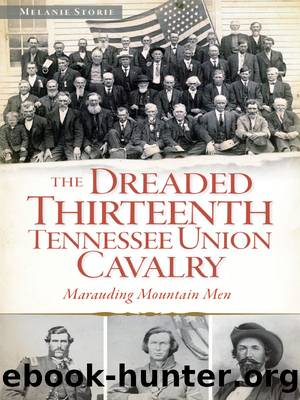The Dreaded Thirteenth Tennessee Union Cavalry by Melanie Storie

Author:Melanie Storie
Language: eng
Format: epub
Publisher: Arcadia Publishing
Published: 2013-01-15T00:00:00+00:00
Officersâ prison, Danville, Virginia. From War of the Rebellion, Edisto Album, PR002-347.2; #aa02064. Collection of the New-York Historical Society.
The Danville prison complex consisted of six brick or wooden tobacco warehouses, each three stories high. All the furnishings had been stripped from the buildings, forcing the men to sleep on the wooden floors. The men slept in rows of four, two rows with their heads toward the wall and two rows with their heads to the center. Conditions were insufferable to say the least when the first groups of Union prisoners arrived and only deteriorated further as time passed and more prisoners arrived.178
Many men from the Thirteenth Tennessee arrived at the prison in Danville in November and December 1864.179 Just a few months earlier, the Danville Prison had been officially declared full âto utmost capacity.â This meant that over 4,500 men were quartered on the upper floors of the six buildings. In addition to the overcrowded conditions, the winter of 1864â65 was so cold that the Dan River, which ran south of the prison, was frozen solid. Yet prisoners continued to arrive, and the overcrowding meant that some men were reduced to sleeping in tents, enduring extreme cold.180 The tobacco warehouses hardly offered more comfort or shelter from the cold, as most of the windowpanes were broken out. Many prisoners died from exposure to the cold since their clothes were threadbare and tattered. One prisoner wrote, âThere was hardly anything that could be called covering.â He estimated that among the men on his floor, numbering approximately 350, âthere may have been sixty or seventy scraps of blanket.â181
Crowded conditions, cold, hunger, vermin and disease all took a toll on the prisoners. Cleanliness was nearly impossible, as one prisoner wrote the fleas and lice âcrawled over the ground from body to bodyâ and âin the darkness there was nothing to be done but to suffer with patience.â Another prisoner likened the lice and vermin at Danville to the Egyptian plagues recorded in the Bible. Some of the prisoners had requested a gardening hoe in order to scrape the filth from the floors, but the request was denied since such an implement could be used as a weapon. On occasion, men thirty at a time were permitted to go outside the buildings to rinse off with muddy river water, all the while guards prodding them with bayonets. The bathing water was so filthy that one private convinced himself that he was âcleaner by keeping my hands out of its contents.â182
As the war progressed, food became so scarce and expensive that it was difficult for average Confederate citizens to obtain, to say nothing for prisoners of war. For instance, in Danville by late 1864, the average price for bacon was four dollars a pound, while a dozen eggs would cost five dollars.183 Prisoners received very little to eat while in confinement, and what they did receive was wholly inadequate. One prisoner described the basic diet as consisting of corn bread and occasionally soup made of refuse bits of bacon.
Download
This site does not store any files on its server. We only index and link to content provided by other sites. Please contact the content providers to delete copyright contents if any and email us, we'll remove relevant links or contents immediately.
In Cold Blood by Truman Capote(3374)
The Innovators: How a Group of Hackers, Geniuses, and Geeks Created the Digital Revolution by Walter Isaacson(3129)
Steve Jobs by Walter Isaacson(2888)
All the President's Men by Carl Bernstein & Bob Woodward(2362)
Lonely Planet New York City by Lonely Planet(2210)
And the Band Played On by Randy Shilts(2185)
The Room Where It Happened by John Bolton;(2145)
The Poisoner's Handbook by Deborah Blum(2126)
The Innovators by Walter Isaacson(2096)
The Murder of Marilyn Monroe by Jay Margolis(2089)
Lincoln by David Herbert Donald(1981)
A Colony in a Nation by Chris Hayes(1922)
Being George Washington by Beck Glenn(1888)
Under the Banner of Heaven: A Story of Violent Faith by Jon Krakauer(1787)
Amelia Earhart by Doris L. Rich(1684)
The Unsettlers by Mark Sundeen(1682)
Dirt by Bill Buford(1668)
Birdmen by Lawrence Goldstone(1659)
Zeitoun by Dave Eggers(1641)
